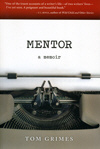Mentor
Mentor: A Memoir by Tom Grimes details the relationship of the author and his friend, teacher, and surrogate father, Frank Conroy. It opens with their initial meeting: Tom, a budding writer considering MFA options, is snubbed by Frank after a reading. "I spotted Stop-Time [Conroy's own critically-acclaimed memoir] on a high shelf and reached for it … I struggled to tear it in half. When I failed, I ripped out pages by the handful until I'd gutted the thing, splitting in two the author's name and the book's title … I turned and said, 'Fuck Frank Conroy.'"
Mentor: A Memoir by Tom Grimes details the relationship of the author and his friend, teacher, and surrogate father, Frank Conroy. It opens with their initial meeting: Tom, a budding writer considering MFA options, is snubbed by Frank after a reading. "I spotted Stop-Time [Conroy's own critically-acclaimed memoir] on a high shelf and reached for it … I struggled to tear it in half. When I failed, I ripped out pages by the handful until I'd gutted the thing, splitting in two the author's name and the book's title … I turned and said, 'Fuck Frank Conroy.'"
Months later, Frank calls Tom personally to invite him to attend the Iowa Writers Workshop. Due to Frank’s faith in Tom’s talents as a writer, and Tom’s neurotic need for Frank’s approval, the two form a unique bond that survives even beyond Frank’s death.
Universally, the book is primarily about writing and the lives of writers: their loneliness, their quirks and struggles. Although a constant presence, Frank is often absent from the immediate action, for example, as Tom struggles to finish his novel or overcome paranoia. Similarly, some chapters detail Frank’s career, long before Tom entered Iowa.
With Mentor, Grimes shifts gears from his usual fiction into personal nonfiction, and occasionally the gears grind – mostly when the topic-at-hand becomes memoir theory, rather than the memories themselves. "I remember only a few dozen sentences spoken over the following two weeks, which is appropriate," begins the chapter immediately after Tom has sold his great American novel, segueing into a psychology lesson:
Every 'true' memoir must be incomplete; what I remember may not be 'true'; and people who know me may disagree with what I recollect. Neuroscientists suspect that the difficulty in retrieving long-term memories depends upon how recently the memory was used, how the memory is connected to other memories, and how unique the memory is.
Certainly, in this post-A Million Little Pieces world, in which Augusten Burroughs is sued by the family of a psychiatrist he wrote about, a writer must be aware of the psychological fermentation of memory and the impact such fermentation might deliver. But Grimes’ explanations break the illusion that all readers look for in a good read, delivering occasional potholes in an otherwise quick and smooth read.





